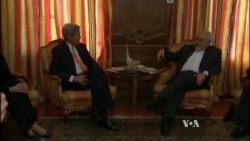In a sign of how much U.S.-Iranian relations have thawed as negotiations over Iran’s nuclear file progress, U.S. Secretary of State John Kerry met Iran’s Foreign Minister Javid Zarif Monday for about an hour at the New York residence of Tehran’s U.N. ambassador.
Kerry arrived at the New York City townhouse, which under diplomatic protocol is considered Iranian territory. He was greeted by Iranian officials and led inside. Zarif arrived a few minutes after Kerry. Neither Kerry nor Zarif spoke to reporters after the private talks in New York.
The U.S. and Iran broke diplomatic relations in 1979, and the two nations only recently have begun engaging over Tehran’s nuclear program.
A framework agreement limiting Iran’s nuclear program was reached April 2 in Lausanne, Switzerland between the six major powers (the United States, Britain, China France, Russia and Germany) and Iran. The parties hope to reach a final deal by June 30.
The two diplomats are in New York for the annual review conference of the Nuclear Non-Proliferation Treaty.
In his address to the U.N. meeting, Kerry was upbeat about the progress of the Iranian nuclear talks.
"I want you to know that the hard work is far from over and some key issues remain unresolved, but we are in fact closer than ever to the good, comprehensive deal that we have been seeking," he said. "If we can get there, the entire world will be safer.”
Speaking on behalf of the 120 nations that form the Non-Aligned Movement, and which Iran currently chairs, Zarif said states have an inalienable right to develop nuclear fuel.
“Accordingly, the choices and decisions of each State party in the field of peaceful uses of nuclear energy should be fully respected,” he said.
Before the meeting, Kerry told reporters he also will raise the conflict in Yemen with Zarif.
The U.S. and several Arab Gulf States accuse Tehran of sending arms and other support to Shi'ite Houthi rebels, who are trying to seize control of the country from the government of President Abdu Rabu Mansour Hadi.
Senate debate continues on deal review
Meanwhile, the U.S. Senate is due to continue debating Tuesday a bill that would give Congress the chance to review any potential nuclear deal struck between Iran and the group of six world powers.
The measure must pass a Senate vote, then another in the House of Representatives before going to President Barack Obama, who has signaled he would sign it.
Lawmakers want to examine the text of a nuclear deal to ensure it would keep Iran from developing nuclear weapons and for Secretary of State John Kerry to provide a report on how the U.S. and the U.N.'s nuclear agency would verify Iran is complying.
The bill also calls for Obama to report to Congress every six months on Iran's nuclear program. It does not require Congress to formally approve an agreement through a vote.
Iran and the group that includes the U.S., Britain, China, France, Russia and Germany have set a June 30 deadline for finalizing a deal after agreeing to a framework earlier this month.
In exchange for curtailing its nuclear activity, Iran would get relief from sanctions that have hurt its economy. Iran has long insisted its nuclear program is peaceful with a focus on uses such as power generation and medical research, not trying to build bombs.
VOA United Nations correspondent Margaret Besheer contributed to this report.












